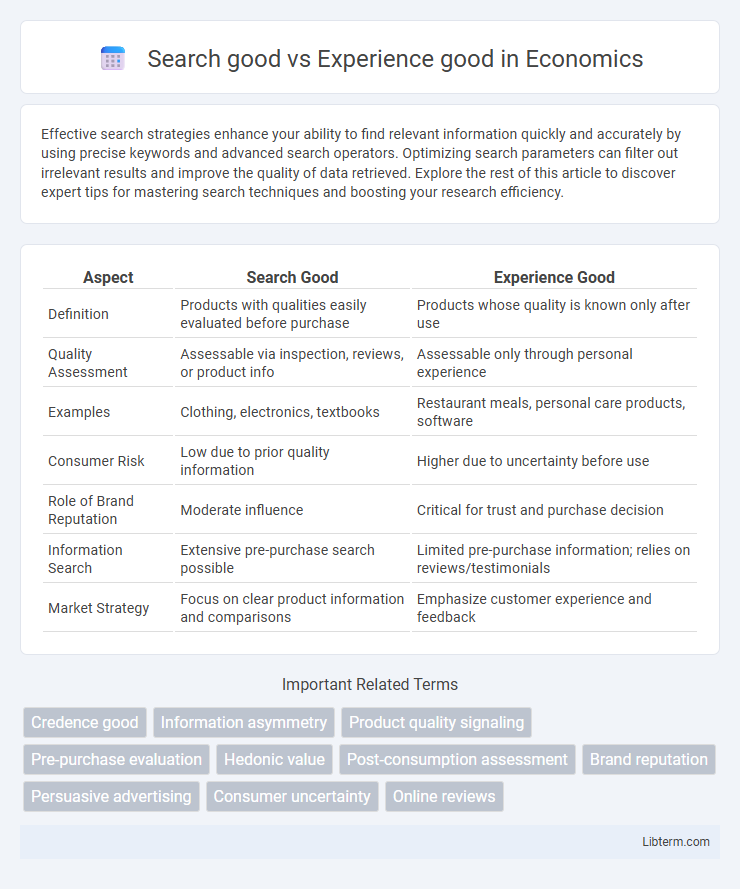Effective search strategies enhance your ability to find relevant information quickly and accurately by using precise keywords and advanced search operators. Optimizing search parameters can filter out irrelevant results and improve the quality of data retrieved. Explore the rest of this article to discover expert tips for mastering search techniques and boosting your research efficiency.
Table of Comparison
| Aspect | Search Good | Experience Good |
|---|---|---|
| Definition | Products with qualities easily evaluated before purchase | Products whose quality is known only after use |
| Quality Assessment | Assessable via inspection, reviews, or product info | Assessable only through personal experience |
| Examples | Clothing, electronics, textbooks | Restaurant meals, personal care products, software |
| Consumer Risk | Low due to prior quality information | Higher due to uncertainty before use |
| Role of Brand Reputation | Moderate influence | Critical for trust and purchase decision |
| Information Search | Extensive pre-purchase search possible | Limited pre-purchase information; relies on reviews/testimonials |
| Market Strategy | Focus on clear product information and comparisons | Emphasize customer experience and feedback |
Defining Search Goods and Experience Goods
Search goods are products or services with attributes that consumers can evaluate before purchase through research, comparison, or inspection, such as electronics or clothing. Experience goods require actual use or consumption to assess quality, including items like restaurants or haircuts. Understanding the distinction influences consumer decision-making, marketing strategies, and information availability across marketplaces.
Key Differences Between Search and Experience Goods
Search goods are products whose qualities and characteristics can be evaluated before purchase through information gathering, such as electronics or clothing. Experience goods require consumption or use to assess value, including services like dining or entertainment. The key difference lies in the ability to assess attributes prior to purchase, where search goods allow informed decisions upfront, while experience goods depend on personal trial for evaluation.
Consumer Decision-Making for Search Goods
Search goods are products with attributes easily evaluated before purchase, such as price, specifications, and quality, enabling consumers to make informed decisions through comparison shopping. Consumers rely heavily on accessible information like product reviews, detailed descriptions, and ratings to minimize uncertainty and reduce post-purchase dissatisfaction. The availability of transparent and verifiable data streamlines the decision-making process, increasing the likelihood of purchasing optimal search goods efficiently.
Evaluating Experience Goods: Challenges and Strategies
Evaluating experience goods poses challenges due to their qualities only being ascertainable after consumption, making pre-purchase assessment difficult. Consumers rely heavily on reviews, brand reputation, and trial options to mitigate uncertainty and make informed decisions. Firms enhance evaluation by offering money-back guarantees, free samples, and detailed product descriptions to reduce perceived risks.
The Role of Information in Purchasing Decisions
Search goods allow consumers to evaluate product attributes such as price, quality, and features before purchase through accessible information, enabling informed decisions. Experience goods require consumers to rely on personal use or trusted reviews since key qualities like taste or durability are only assessable post-purchase. Information availability significantly influences purchasing decisions by reducing uncertainty for search goods, while experience goods depend heavily on reputation, brand trust, and word-of-mouth to guide consumer choices.
Examples of Search Goods vs. Experience Goods
Search goods include products like electronics, clothing, and books, where consumers can easily evaluate quality through specifications, reviews, or physical inspection before purchase. Experience goods consist of items such as restaurants, vacation packages, and personal care services, which require consumption or use to assess their true value and satisfaction. For instance, buying a laptop involves comparing features and ratings, while choosing a hotel relies on past guest experiences and service quality revealed only after a stay.
Impact of Digital Technology on Search and Experience Goods
Digital technology significantly enhances the accessibility and evaluation of search goods by providing detailed product information, reviews, and comparison tools online, enabling consumers to make informed decisions before purchase. Experience goods benefit from digital innovations through augmented reality, virtual try-ons, and immersive content that simulate the consumption experience, reducing uncertainty associated with the lack of physical evaluation prior to purchase. E-commerce platforms and social media further influence consumer perceptions and trust in both search and experience goods by facilitating peer feedback and interactive engagements.
Marketing Approaches for Search and Experience Goods
Marketing approaches for search goods emphasize clear, detailed product information and price comparisons, as consumers can evaluate these attributes before purchase; techniques include transparent specifications and competitive pricing. Experience goods require marketing strategies that build trust and demonstrate quality through trials, testimonials, and brand reputation since consumers assess value only after use. Leveraging online reviews, sampling, and immersive storytelling enhances consumer confidence and reduces purchase risk for experience goods.
Consumer Trust and Risk Perception
Search goods, characterized by attributes easily evaluated before purchase, foster higher consumer trust due to transparent information and reduced uncertainty. Experience goods, requiring consumption to assess quality, elevate perceived risk and rely heavily on brand reputation and reviews to build trust. Consumers often exhibit risk aversion toward experience goods, making trust signals crucial in purchase decisions.
Future Trends in Search and Experience Goods Marketing
Future trends in search goods marketing emphasize AI-driven personalization and enhanced data analytics to improve consumer decision-making by providing detailed product information and reviews. Experience goods marketing increasingly leverages augmented reality (AR) and virtual reality (VR) to allow consumers to virtually try products, enhancing sensory engagement and reducing purchase uncertainty. The integration of blockchain technology ensures transparency and trust in both search and experience goods through verified provenance and authentic user feedback systems.
Search good Infographic

 libterm.com
libterm.com